|


256-bit encryption
$500,000 protection

|
BONHOMME RICHARD model
Bonhomme Richard was a warship in the American
Continental Navy. She was originally an East
Indiaman, a merchant ship built for the French
East India Company in 1765. She was placed at
the disposal of John Paul Jones on 4 February
1779, by King Louis XVI of France as a result of
a loan to the United States.
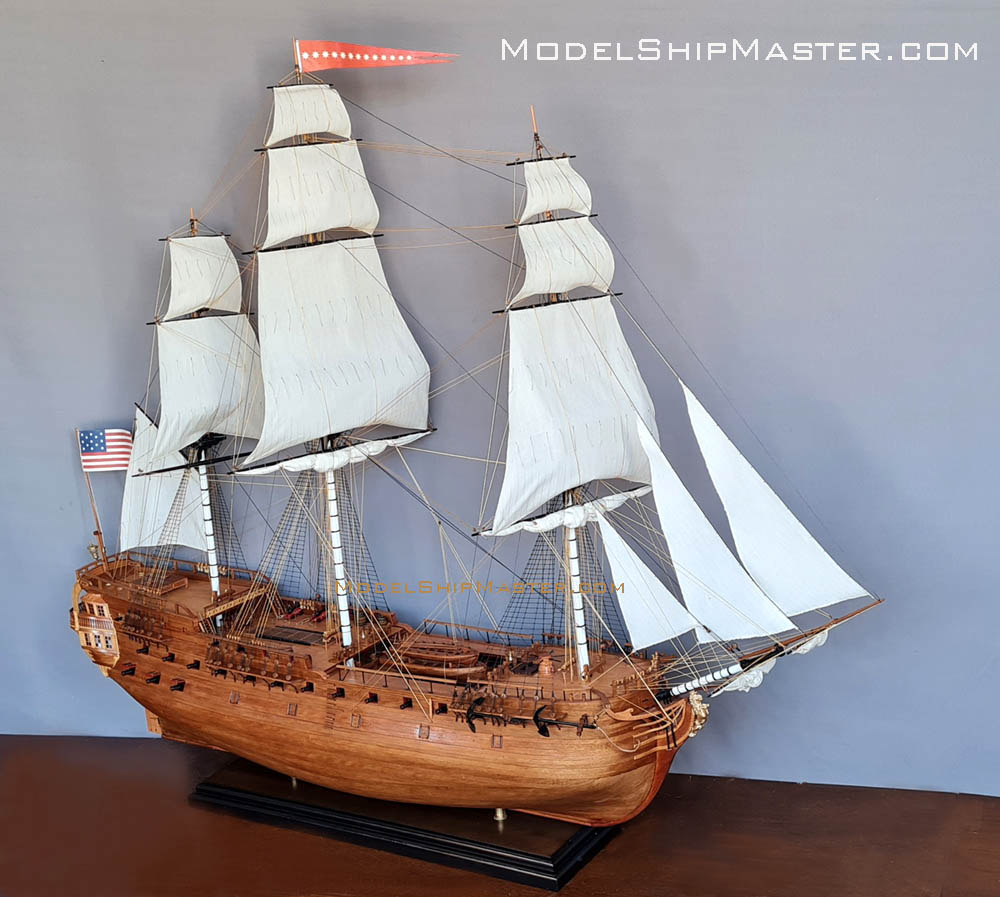
Bonhomme Richard was built an East Indiaman
designed in a way that allowed her to be quickly
transformed into a man-of-war. She made two voyages to
China, the first in 1766 and the second 1769. At her return the French East India
Company had been dissolved, and all its installations
and ships were transferred to the French Navy. She was purchased by King
Louis XVI of France in early 1779.
As the
Revolutionary War raged on in the Colonies, the newly
founded Continental Congress began gathering a small
navy. In 1777, ambassador Benjamin Franklin was
sent to advise the French Court and
garner more European support efforts for the American
war. In 1779, the King of France donated to the American
cause the East Indiaman.
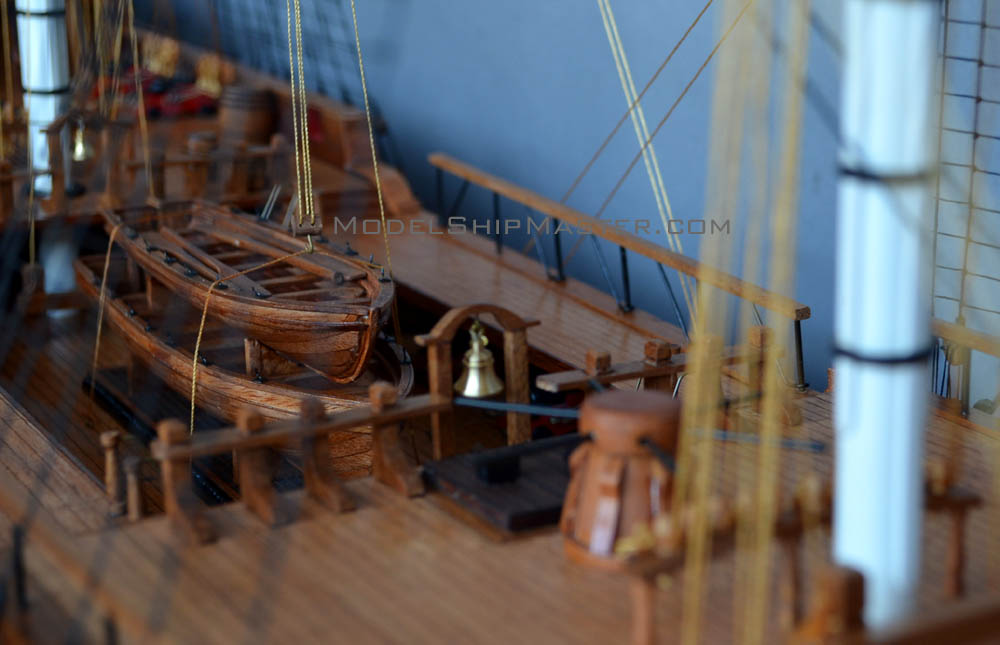
On February 4, 1779, the Continental Congress placed the
newly formed fleet under the command of the Captain John
Paul Jones. Swiftly, Jones refitted the East Indiaman and
renamed her Bonhomme Richard which was Benjamin
Franklin's pen name.
Jones
moved the riding bitts from the upper deck to the lower,
then blocked up the old hawse holes and had new ones
opened on the lower deck to work the ship’s anchor
cables. He also installed a pair of bow-chaser ports in
the beakhead bulkhead, nearly
doubled the quarterdeck's length, extending the break
about twenty feet forward until it covered the mainmast. He then had the quarterdeck bulwarks raised and pierced
by a total of ten gunports, though in the end he armed
only the six ports closest to the stern with a battery
of 8-pounders. He also had the poop bulkhead moved
forward a few feet until it covered the mizzenmast, to
enlarge the Great Cabin below.
On the upper deck of the Bonhomme Richard, Jones had all the gunports enlarged
to take his battery of 12-pounders (they were originally
designed for 8-pounders.) He also ordered two new pairs
of gunports to be installed – one pair afore the
foremost guns near the bow and the other in the Great
Cabin at the stern. In the end, he armed only the
latter.
On the Bonhomme Richard's lower deck, Jones retained the six open
ports, uncovered eight more of the previously berthed up
ports, and carved a new pair (one per side) in the
gunroom at the after end of the deck, giving him a total
of 16 ports for his heaviest guns. However, he was able
to obtain only six 18-pounder guns, and he placed them
in the three after-most pairs of gunports.
The newly-renamed Bonhomme Richard was capable of having
58 guns but in practice carried 40.
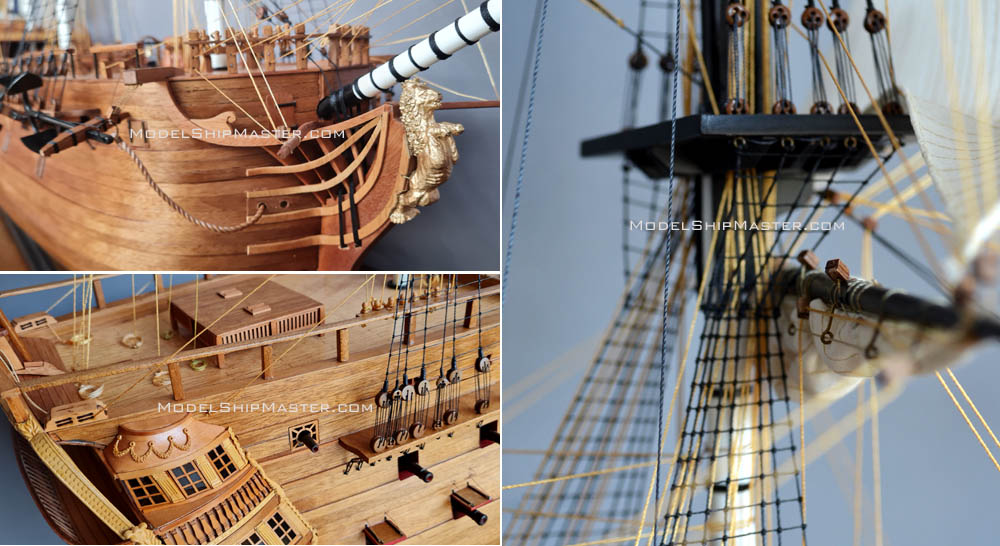
On 23 September 1779, after taking 16 English merchant
vessels as prizes, the squadron including Bonhomme
Richard and four other ships
encountered the Baltic Fleet of 41 under convoy of HMS
Serapis near Flamborough Head.
Bonhomme Richard and Serapis entered a bitter engagement
at about 6:00 p.m. The battle continued for the next
four hours, costing the lives of nearly half of the
American and British crews. British victory seemed
inevitable, as the more heavily armed Serapis used its
firepower to rake Bonhomme Richard with devastating
effect.
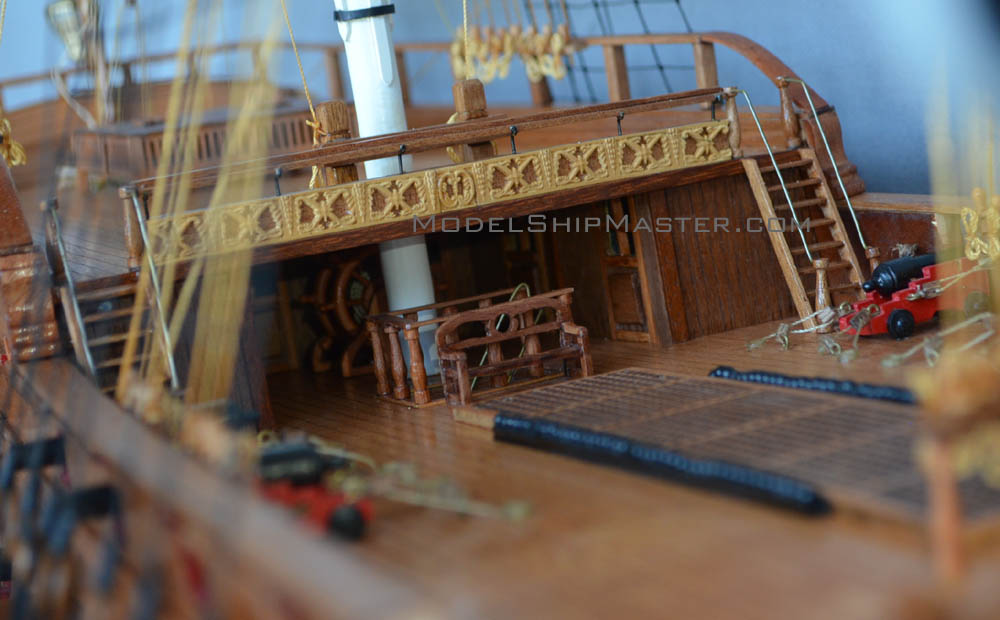
Although his subordinates regarded the situation as
hopeless. Jones eventually managed to lash the two ships
together, nullifying his opponent's greater
maneuverability and allowing him to take advantage of
the larger size and more numerous crew of Bonhomme
Richard. An attempt by the Americans to board Serapis was repulsed, as was an attempt by the British
to board Bonhomme Richard.
Burning, sinking, and scattered with the dead and
wounded, Bonhomme Richard lit up the darkness. Jones
struggled to keep his vessel afloat and, in one
instance, an overwhelming number of prisoners in hold
threatened to rush the deck to save from drowning. Jones
defied all odds and continued the fight against Captain
Pearson.
In the final hour, Bonhomme Richard's mast was hit above
the top-sail. Along with her Colors, a large section of
the mast came crashing to the deck near Jones’s feet. In
response to the downfallen colors, Serapis called out,
"Have you struck your Colors?" Resoundingly, John Paul
Jones exclaimed, "Struck Sir? I have not yet begun to
fight!" With newfound will, his crew delivered decisive
blows from all sides and aloft. Jones' sent 40 marines
and sailors into the rigging with grenades and muskets.
Decimated, Serapis struck her Colors at 10:30 PM.
Sadly, Bonhomme Richard –
shattered, on fire, leaking badly – sank 36 hours
later at 11:00 AM on 25 September 1779. John Paul
Jones commandeered the English ship and sailed her to Holland.
This epic battle was the American Navy's first-ever
defeat of an English ship in English waters. Rallying
colonial hope for freedom, Jones' victory established
him to many as "The Father of the American Navy."
The
battle's outcome was one important factor that convinced
the French crown to back the colonies in their fight to
become independent of British authority. Thus Bonhomme
Richard played a historic role in America's fight for
independence.
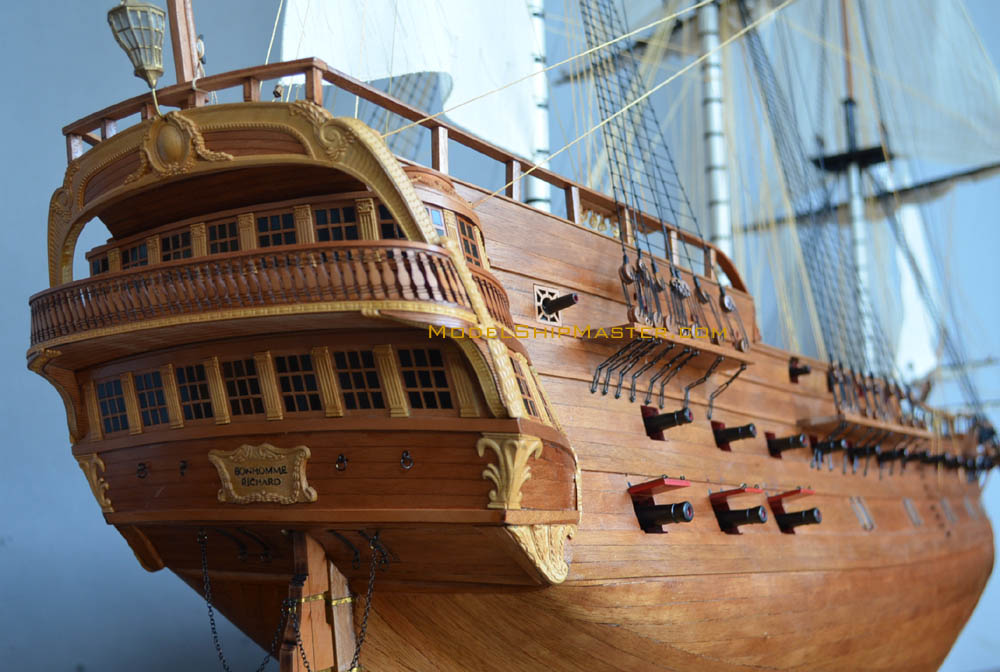
Our
Bonhomme Richard model
is the most accurate. Its hull is not black.
Its boats' interior does
not have green color. Its stern flag is not a Serapis
flag which is supposed to fly on the captured Serapis (John
Paul Jones did not have a flag on his prize and he had
to make up one in order to avoid being mistaken a pirate
ship.) If you notice, our model's guns have three
different sizes--one for each deck level. There are
several other important features that a retailer who
wildly claims to be "widely
recognized leader in handmade tall ships"
does very wrong (hull, sails, rigging) but we do
not waste our time to say them all here.
We build this
primarily wood
Bonhomme Richard
model
in two sizes:
35"
long
x 27" x 11"
(1/64 scale)
$6,390
Shipping and insurance in the
contiguous US included.
Other places: $600 flat rate.
Model is built per commission only. We require only a
small deposit (not full amount, not even half) to start the process. The
remaining balance won't be due until the model is
completed.
Click on this link for
lead time.
56" x 47" x 14"
$10,450
Shipping and insurance in the
contiguous US included.
Other places: $1,100 flat rate.
Model is built per commission only. We require only a
small deposit to start the process. The
remaining balance won't be due until the model is
completed.
Please click
here
for more information.
Learn more about the
Bonhomme Richard
here:
https://en.wikipedia.org/wiki/USS_Bonhomme_Richard_(1765)
|